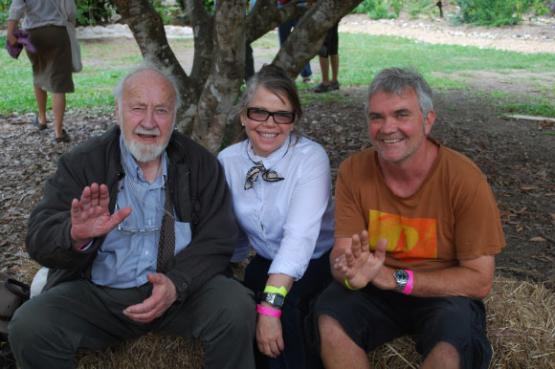ALIVE! Meet Pedro Parra - rock fan, wine terroir consultant and winemaker in Chile
3 min read
Pedro Parra holds a PhD in terroir and a masters degree in precision agriculture. He travels the world as a terroir consultant and makes his own vintages in the Itata region of Chile. At Alive! he will host a talk called 'Why Rocks Matter Most.'
Why do rocks matter most?
90% of the good wines of the world are from rocks - different kinds of rocks. Barolo, Barbaresco, Ruedo, Chianti, Montalcino, Etna ,Burgundy, The Loire, the Northern Rhone, a lot of Bordeaux, Ribera del Duero, La Rioja, Griegos, Ribeira Sacra, Bierzo - they are all about the stones.
The topsoil, the first part of the soil, is very similar around the world. All the roots go through this part at one moment in their life. I call that a McDonald's, because it's where you eat something that normally is not very good.
Then, normally, they are going to reach the subsoil - human intervention cannot go that deep. And in many places at one to five metres down - the mother rock, the geology. In both cases, what happens down there is a mystery and in my opinion is going to deliver the genetics of the vines.
The roots reach down there to find food and water and they will find energy. It may sound esoteric but not to me. The roots cannot eat in the mother rock because it's too hard. The roots feed in the fractures of the rock - each mother rock creates a family of fractures.
Every fracture is like a different restaurant and you will get oxidation, you will get reduction, you will get temperature, you will get clay, you will get sand, you will get silt, you will get iron, you will get micro elements. And this is going to define the restaurant. One restaurant can be Asian, another can be Italian, another can be French. So you are going eat different food. And that is what makes every site special.
The minerals are dissolved in water. Mineral water can taste very different depending on the source. In Etna, for example, that is volcanic water. So the mineral components of the water are very different, very unique.
In this interaction between the root need the help of somebody - like plugging in a guitar to play music - and that is the mycorrhizals, the microbiology that you find down there. That's why when you spread fertilizers, you kill some of the special aliens that connect the energy, you're killing your terroir, because you're disconnecting the music. That's why what happened in Burgundy in the 70's. Everything was disconnected. And the wines were unbalanced. When you connect back you can reach the balance again. That's why it's so important to really understand that microbiology is essential to the connection and to the movement of energy through the wines then onto the grapes and into your winery. It's the skin of the grapes that makes the difference, less than the juice.
Why is the process so poorly understood?
Imagination is everything to me on wine and terroir because you will never get the true answer. Point number one is that nobody knows. Where does the soil end for your vines? How deep is the real interaction between the roots and the soil? Can we analyze that? I mean, if the roots go five metres down, how can we know? It's like going to see a movie and you don't see the end.
The problem is that you need to understand wine first. Not soil. And people who develop research on terroir are soil specialists or geologists but they don't drink wine. So there is this important misconnection between the aim of the study and the study itself. It's the language of wine that should dominate the discussion - not the language of soil. That is a big, big problem.
That's why I stopped attending, you know, conferences and everything because all the people that were there has very, very, very little culture of win. Yeah. So they can discuss for one year about the soil, but we don't care, we care about the wine.
Tell me about your winery in Itata.
Four years ago, I changed my approach totally - 100%. I went from high temperature fermentations, like in Burgundy where they go up to 30, 31, 32 C, to extremely low temperatures - 18, 19, 20. I'm trying to avoid extraction by temperature. And no more human extraction - no pigeage and pumping over. I do nothing to extract because I want my wines to be the extraction from the terroir.
What I do extract at the end of the process by maceration. So it's a longer maceration that happens in the tank. Yeah. In Burgundy they can do 10 days of maceration. In my case, I will do maybe 20, 30, 40 days of maceration. That is the moment of complexity and extraction. I don't want heavy wine. I want complexity and elegance and finesse. I completely changed how you play the music.
To find out more, join Pedro for his talk at Alive! on Monday, 6 December. Buy your tickets now!


